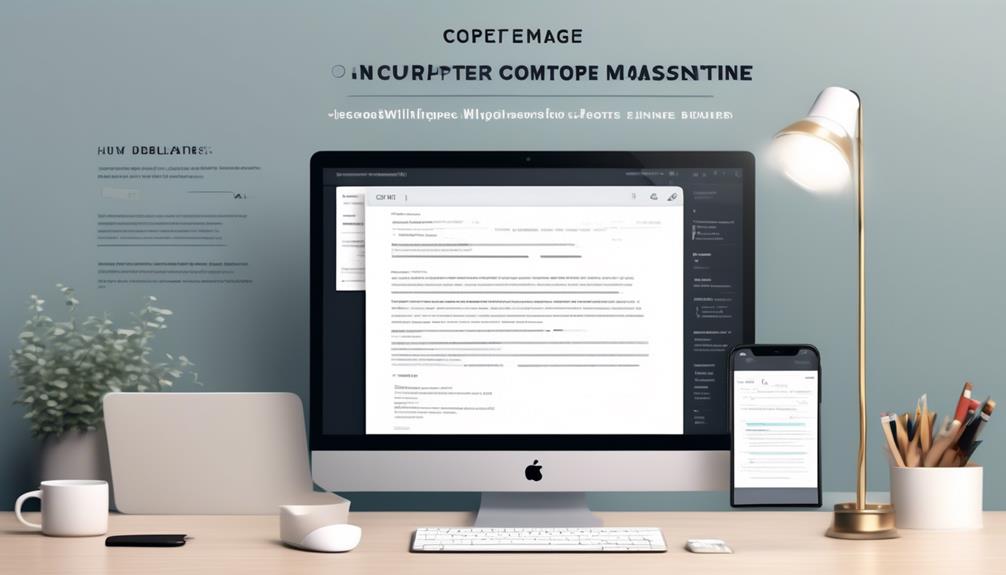You’ve become adept at sharing cat memes with your coworkers, but now it’s essential to enhance your email skills and compose a message for your boss that doesn’t make them question their decision to promote you.
As professionals, we all know the struggle of finding the right balance between formality and friendliness when communicating with our superiors. But fear not, because in this discussion, we'll uncover the secrets to composing an email that will not only grab your boss's attention but also make them appreciate your clear and concise communication.
Curious to know how to strike the perfect tone in your next email to the boss? Let's explore together.
Key Takeaways
- Use a clear and concise subject line that accurately reflects the purpose of the email.
- Address your boss with a professional greeting, using their preferred title and last name.
- Be direct and get straight to the point in the body of the email.
- Maintain a professional and respectful tone throughout the email.
Email Etiquette for Messaging Your Boss
When messaging your boss, it's crucial to adhere to proper email etiquette to ensure clear and respectful communication.
The first step is to use a clear and concise subject line that accurately reflects the purpose of the email. This helps your boss understand the urgency and importance of your message.
Addressing your boss with a professional greeting, using their preferred title and last name, maintains a respectful tone and sets the right impression.
It's essential to communicate the reason for your email clearly and directly, avoiding unnecessary preamble to respect your boss's time.
Additionally, maintaining a polite and professional tone throughout the email is crucial. Avoid using demanding or aggressive language, as this can come off as disrespectful.
Lastly, always proofread your email for spelling, grammar, and clarity before hitting send. This ensures a professional and polished message.
Adhering to these email etiquette guidelines when messaging your boss showcases your professionalism and respect for their time and position.
When to Email and When to Call Your Boss

We often assess the urgency and sensitivity of the matter before deciding whether to email or call our boss. It's crucial to use our judgment when determining the appropriate mode of communication with our boss, especially when delivering sensitive or challenging information.
Here's when to email and when to call your boss:
- When to Email:
- For non-urgent matters related to the work schedule or requesting time off.
- When providing feedback or assistance in providing information for a project.
- To request a meeting to discuss a specific topic or to follow-up after a conversation.
- When to Call Your Boss:
- When the matter is urgent and requires immediate attention.
- For sensitive topics that are better discussed verbally rather than in writing.
- When seeking approval for a work-from-home arrangement or any other significant decisions.
Understanding the appropriate times to email or call your boss is essential for effective communication and maintaining a professional relationship. By considering the urgency, sensitivity, and nature of the communication, we can ensure that our interactions with our boss are respectful and productive.
Email Format to Boss
Addressing your boss in a professional email requires careful consideration of the format and language to ensure clear and respectful communication. When writing an email to your boss, it's essential to use a clear and concise subject line that accurately reflects the purpose of the email.
Starting with a professional greeting, such as 'Dear Mr./Ms. [Last Name],' sets a respectful tone. In the body of the email, it's crucial to be direct and get straight to the point, providing a concise description of the reason for the email without unnecessary preamble.
Throughout the email, maintaining a professional and respectful tone is paramount. It's important to avoid using demanding or aggressive language. When concluding the email, be sure to include a professional sign-off phrase, express gratitude, and provide your contact information.
In addition, if you're requesting time with your boss via email, it's important to include a clear call to action, such as 'I would appreciate the opportunity to discuss this further with you. Could we schedule a meeting at your earliest convenience?' This approach demonstrates professionalism and clarity in communication.
Examples of How to Write an Email to Manager

Transitioning from the previous discussion on email format to boss, let's explore practical examples of crafting professional emails to your manager for effective communication in the workplace.
- Follow-Up Email After a Performance Review
After a performance review, you might send an email to your boss expressing gratitude for the feedback and outlining actionable steps you plan to take to address any areas for improvement. This demonstrates your commitment to growth and development.
- Request for Time and Assistance
If you need to request a meeting with your manager, be direct and specific about the purpose of the meeting. For instance, if you require assistance with a project, clearly outline what you need help with and propose potential solutions.
- Email Requesting a Letter of Recommendation
When requesting a letter of recommendation, be sure to provide all necessary details such as the purpose of the recommendation, key achievements you'd like highlighted, and any specific points you'd like the manager to address.
Crafting professional emails to your manager is essential for maintaining effective communication in the workplace. By following these examples, you can ensure that your emails are clear, respectful, and purposeful.
Tips for Writing an Email to Your Boss
Crafting effective emails to your boss requires adherence to professional etiquette and clear communication. When writing an email to your boss, it's essential to use a clear and informative subject line that conveys the purpose of the email. Starting with a professional greeting and addressing your boss appropriately sets the tone for the communication. Be direct and get to the point without unnecessary preamble in the email. Using clear and easy-to-understand language, while avoiding technical terms unless necessary, ensures that your message is easily comprehensible.
In closing the email, end with a clear call to action, stating the next steps or desired response to prompt a timely and appropriate reply.
If you're looking to request a performance review, make it clear in the subject line and the opening of the email. For example, 'Request for Performance Review Discussion.' In the body of the email, you could say, 'I'm writing to request an opportunity to discuss my progress and performance in the upcoming weeks. I'd greatly appreciate the chance to sit down with you and go over my achievements and areas for improvement. I hope this email finds you well, and I look forward to hearing your thoughts on this matter.'
This approach demonstrates professionalism and clarity, making it more likely for your boss to respond positively to your request.
Frequently Asked Questions
How Do You Start an Email to Your Boss?
When we start an email to our boss, we want to be professional and respectful. It's important to use a formal greeting and address them by their appropriate title.
We also need to clearly state the purpose of the email and be concise in our communication. It's essential to maintain a polite and professional tone throughout the email and to use proper grammar and spelling.
How Do You Write a Professional Email to an Employer?
When writing a professional email to an employer, we always start with a clear subject line that summarizes the purpose of the email.
Then, we use a respectful and professional tone throughout the message, addressing the recipient by their proper title and using appropriate language.
It's important to be concise and to the point, while also being polite and considerate in our communication.
How Do I Write an Email to My Boss About Concerns?
When addressing concerns in an email to our boss, it's crucial to be tactful and clear. Statistics show that effective communication with superiors can lead to positive outcomes.
We should start by expressing our concerns in a respectful manner, providing specific details and potential solutions.
It's important to maintain a professional tone and offer to discuss the matter further if needed.
Clear communication is key in addressing concerns with our boss.
How Do You Message Your Boss Professionally?
We communicate with our boss professionally by using clear and concise language. It's important to be respectful and considerate of their time. We make sure to address them appropriately and to the point.
We also pay attention to our tone and ensure our message reflects a professional demeanor. It's crucial to proofread our communication to catch any errors before sending.
Conclusion
In conclusion, following good email etiquette when communicating with your boss is essential for building a strong professional relationship.
Did you know that 67% of employees feel that clear communication from their boss directly impacts their job satisfaction?
By using clear and concise language, you can ensure that your messages are well-received and contribute to a positive work environment.









